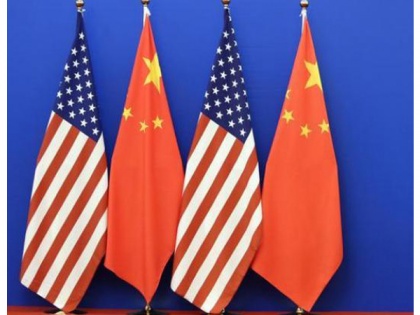US ramps up pressure on China, new strategic competition policy to impact tech firms
By ANI | Published: April 11, 2021 07:42 AM2021-04-11T07:42:04+5:302021-04-11T07:50:03+5:30
The US Senate's new policy, the Strategic Competition Act of 2021, lays out a wide-ranging strategy that would have a "profound effect" on Chinese entities as the relationship between the two economic superpowers deteriorate.

US ramps up pressure on China, new strategic competition policy to impact tech firms
The US Senate's new policy, the Strategic Competition Act of 2021, lays out a wide-ranging strategy that would have a "profound effect" on Chinese entities as the relationship between the two economic superpowers deteriorate.
"The legislation will have a profound effect on every Chinese technology firm," said Cameron Johnson, an adjunct faculty instructor at New York University and a partner at Shanghai-based Tidal Wave Solutions told South China Morning Post.
Johnson added: "This includes in terms of developing new technologies, global investment strategies, selling into US-allied countries, receiving support from the Chinese government, and how the country's technology market interacts and influences global governance and standards-setting."
South China Morning Post reported that the section on science and technology in the 283-page bill, which US lawmakers plan to introduce next week, includes efforts to provide help for American compes to diversify their global supply chain; total or partial acquisition of infrastructure like 5G mobile networks and undersea cables; negotiations for bilateral and plurilateral digital trade agreements; and building up cybersecurity capabilities.
The bill stated that China's drive to become a "manufacturing and technological superpower" and to promote "innovation with Chinese characteristics" has come at the expense of human rights and long-standing international rules of economic competition.
The bill calls for sanctions against Chinese officials accused of "forced labour, forced sterilisation and other abuses in Xinjiang", where human rights groups cite United Nations reports and witness accounts that as many as 1 million Uyghurs and other Muslim minorities are held in "re-education camps". Beijing has repeatedly denied the allegations, insisting that the camps are vocational training facilities.
According to SCMP, the legislation would also earmark US$10 million "to promote democracy in Hong Kong" and require the State Department to produce a report on "the extent to which the Government of China uses the status of Hong Kong to circumvent the laws and protections of the United States".
" (The bill) Focuses on countering and confronting China's predatory international economic behaviour, and includes measures to track intellectual property violators, Chinese government subsidies, monitor Chinese use of Hong Kong to circumvent U.S. export controls, and track the presence of Chinese compes in U.S. capital markets. Directs the United States to provide technical assistance to countries working to counter foreign corrupt practices, and debt relief to the poorest countries who have requested forbearance due to the COVID-19 pandemic," a statement from the US Senate Committee on Foreign Relations read.
The bill also "calls for enhanced coordination and cooperation with allies on arms control in the face of China's military modernization and expansion, and requires reporting on Chinese ballistic, hypersonic glide, and cruise missiles, conventional forces, nuclear, space, cyberspace and other strategic domains."
If passed, the bill would void all restrictions on US officials' interaction with Taiwanese counterparts. The legislation calls for additional efforts to strengthen military ties with allies and partners in the Indo-Pacific region.
The bill would mandate forcing Beijing to honour a 2016 ruling by an international tribunal that artificial islands China had built near the Philippine coastline, including at Mischief Reef, violated Mla's sovereign rights.
Asked about the bipartisan legislation, State Department spokesman Ned Price declined to comment specifically on the Menendez-Risch bill, but added: "We have spoken of competition with China as a defining challenge for this administration, that we will enjoy the greatest amount of success when we work hand in hand with Congress, and when our proposals, find support on both sides of the aisle."
Under the Trump administration, ties between the two countries had deteriorated over issues such as human rights violations in Xinjiang, encroachment on the special status of Hong Kong, accusations of unfair trade practices by Beijing, lack of transparency concerning the pandemic and China's military aggression in various parts of the world.
( With inputs from ANI )
Disclaimer: This post has been auto-published from an agency feed without any modifications to the text and has not been reviewed by an editor
Open in app